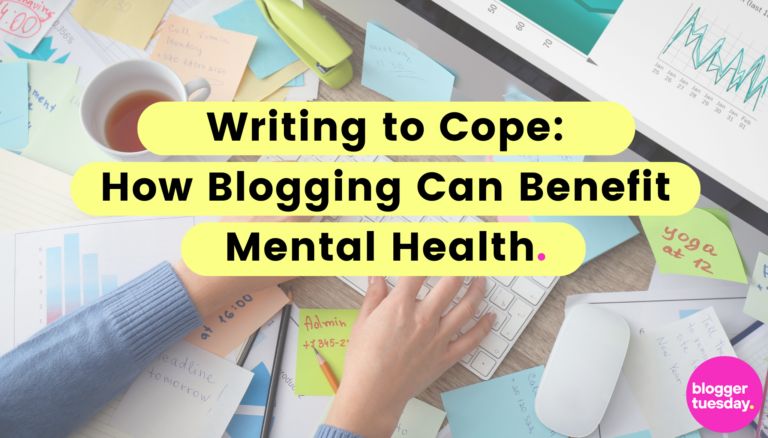According to the National Institutes of Health, “Blogging gives people a chance to express their emotions, engage in self-talk, and organise their thoughts, all of which are associated with psychological and emotional health.”
In that respect, blogging is similar to journaling, an age-old technique psychotherapists have used for over a century. Writing is a way to expunge negativity and take more control of a situation.
Research estimates that 26 per cent of people experience a diagnosable mental disorder in any given year. This statistic means one in two will develop a mental health condition in their lifetime.
Consequently, blogging’s value is rising. Spending time writing in the flow state may be a powerful way to reduce low mood and other common mental health problems.
But why is this the case? Here, we find out.
This post explores reasons blogging can benefit your mental health through various psychological paths.
An Emotional Outlet
Blogging can benefit your mental health because it is an emotional outlet. Getting ideas out of your head and onto paper is almost cathartic, giving you a sense of relief.
Researchers are still trying to explain why it is so effective. But one hypothesis is that it creates awareness. People who write down their thoughts and feelings “concretise” them, making them simpler to understand.
According to scientists, putting an experience into words lets you take a new perspective on events. You can get past confusing emotions and go straight to the crux of the issue, whatever that is.
For example, working in a high-stress environment might make you chronically anxious. But you might discover the origins of these sensations when you write about your work. Reflection could reveal that you feel a certain way because of your excessive caseload or the fact your office reminds you of bad times at school.
Self-Reflection
Related to this, blogging also encourages self-reflection. It forces you to ponder your emotions and consider how they shape your attitudes and behaviour to create valuable content.
Of course, going through self-reflection is challenging. You may discover things you don’t want to find out.
But ultimately, it can be helpful. Self-reflection reveals the triggers and thought patterns that lead to poor mental health.
Insights like these take time to emerge, even if you work with a therapist. Often, it requires logical deduction and profound insights to understand why your mental health is what it is. And blogging can facilitate that.
Sense Of Accomplishment
Blogging could also help with a general sense of ennui or “dysphoria” about your life. Creating high-value popular articles gives you a sense of accomplishment, fulfilling your innate need for challenge.
Some researchers believe the rise in present apathy and life dissatisfaction comes from an evolutionary mismatch between us and our environment. Historically, people lived hand-to-mouth, just trying to survive. Being surrounded by death made them focus on the present.
But now, that situation is changing. Comfortable lives mean people don’t feel the same stress levels and, therefore, have time to ponder deeper questions. Ironically, the lack of threat causes many people to feel like something’s wrong with life.
Blogging helps break you out of this cycle by giving you a focus that makes life feel more meaningful and engaging. While it might not be the same as living in poverty, it can fulfil a similar purpose.
Connection To Other People
Another benefit of blogging is the connections you form with others. Writing a blog can introduce you to thousands of new people who can all offer support.
This idea that feeling more connected to others improves mental health makes sense. Studies find a consistent relationship between being alone and various psychiatric disorders, such as child abuse, sleep problems, personality disorders, depression and Alzheimer’s disease. Evolutionary biologists try to explain this using the idea that we are “social creatures.” Being by ourselves increases stress levels because we must take care of ourselves. In turn, this generates maladaptive responses, such as those described above.
This might also be why loneliness correlates with various physical disorders like diabetes, autoimmune diseases like rheumatoid arthritis, lupus and cardiovascular diseases like coronary heart disease, hypertension (HTN), obesity, physiological ageing, cancer, poor hearing and poor health.
Direct evidence also supports the idea that blogging improves connections to other people. Studies find that perceived social support is higher among bloggers, even if they do not interact with others in person. These results corroborate other studies showing the helpfulness of interacting with people who share similar interests.
Reduction In Rumination
Blogging may also reduce rumination, a hallmark of generalised anxiety disorder, post-traumatic stress disorder, and obsessive-compulsive disorder. Writing and content creation prevent you from dwelling on swirling thoughts and focus on something else.
The reason for this comes back to the nature of writing. Researchers believe it is a “whole-brain” activity. That’s because it recruits various neurons from the cortex and other areas involved in memory, logical inference, storytelling, tactile movements, creativity, and problem-solving. Most humans find writing so challenging that they can’t ruminate simultaneously.
Writing is also an excellent way to get into the “flow” state. During this process, your brain shifts from stressful beta waves into slower alpha and theta patterns, fundamentally changing its operation. These states are associated with deep meditation, again making rumination-related suffering less likely.
Inspiration
Finally, blogging can help you overcome apathy through inspiration. Exploring the world and sharing valuable knowledge with others helps to make existence more meaningful.
Think about the last time you wrote about an insightful topic or a beautiful place you visited. Chances are the process made you feel more connected and “alive.” Blogging has a tremendous ability to open your eyes to different perspectives and opportunities.
Wrapping Up
In summary, writing can be a valuable coping tool. Using it effectively makes it more likely you will avoid the negative thought patterns that cause anxiety, depression, and other mental health conditions. It can also enrich your life, connecting you to great people and experiences.


